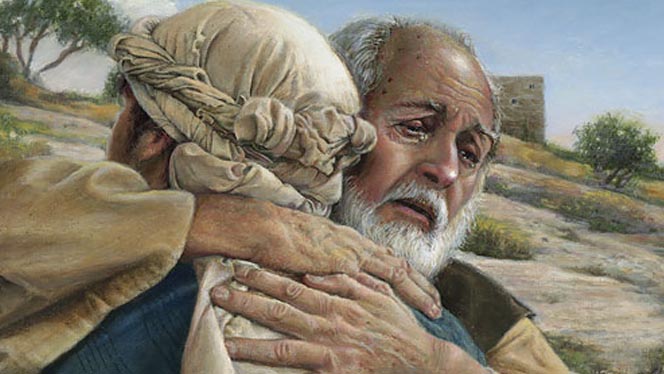We have almost reached the half-way point to Calvary. The forty days of Lent remind us of the forty days in the desert, but we must also keep in view that Our Lord now has his sights set on Jerusalem. We’ve spent a few weeks in the desert, living our Lenten resolutions, and maybe our stomachs, or spirits, are starting to grumble for those things we’ve left behind for these forty days. How are our Lenten resolutions holding up? The Lenten resolutions are how we enter the desert. If you haven’t giving anything up for Lent yet, it’s not too late, but once in the desert, you have to stay the course if you want to reach the Promised Land.
As today’s First Reading reminds us, God is never indifferent to our struggles. When Moses asks God how he should identify him to the Israelites, suffering under bondage in Egypt, God tells them, “tell them I AM has sent you.” God is always there. He doesn’t just stop with that: he reminds them he is the God of Abraham, Isaac, and Jacob to remind them that he is always faithful to his promises. He promised Abraham land and countless descendants if he had faith. Isaac was the fulfillment of that promise, and then Jacob became the father of the twelve tribes of Israel. Despite this, when Pharaoh let Moses lead Israel out into the desert, they had forty years of wandering before they entered the Promised Land – and many never made it.
In today’s Second Reading St. Paul reminds us that all the Israelites in the Exodus received the same gifts from God, but many didn’t stay the course out of evil desires. Their forty years in the desert were due to a lack of trust in God. He’d taken them to the Promised Land, but they were too scared to enter. They put their trust in food and water (and God sent them dew and manna, and quail to eat), money, ceremonies (trying to set up worship apart from Moses), authority and rumor mongering (asking why Moses should be the only one to speak on their behalf) – and they perished.
Our Lord doesn’t mince words in today’s Gospel about how we can stay the course in the desert. We’re guilty many times of the same thing as the Israelites. We don’t understand what the desert is for: a place for God to purify the hearts of the ones he loves, away from distractions. There are far fewer distractions in the desert, but the rumbling of our stomachs is also louder, and we ask ourselves what we’re really hungering.
Today’s Gospel shows the Jews in a drought of hope. Pilate has slaughtered a group of Galileans as they were offering worship. The Jews ask Jesus why. Why would God allow such as thing? Jesus adds an accident to the list of doubts: eighteen dead in a tower collapse in Siloam. Our Lord’s words are far from comforting: they are in the same danger, just as we are. Staying the course doesn’t mean not taking risks or making sacrifices (that wouldn’t have saved the Galileans), nor does it mean getting lucky (that wouldn’t have saved the people crushed in Siloam); staying the course means putting your trust in God and showing it. We show it by bearing fruit.
Fruit? In a desert? We are in a desert, and God wants us to bear fruit. We bear fruit by trusting in God’s patience with us (in the parable he gives the fig tree four chances to get its act together), and, as Jesus tells us, by repentance. Lent is about repentance, not just for our sins, but for the sins of the whole world. And the Church teaches us three ways to prepare the soil: fasting, prayer, and almsgiving. Penance prepares the soil, but the sacraments are how we draw close to Christ and the Holy Spirit. Jesus waters the soil with his own blood so that we can bear fruit. The Eucharist gives us strength for the journey, and the Sacrament of Reconciliation puts us back on our feet and turns us back in the right direction. The fruits of the Spirit will come, as Scripture reminds us: charity, joy, peace, patience, kindness, goodness, generosity, gentleness, faithfulness, modesty, self-control, and chastity. By repentance and the sacraments we gain the strength to bear these fruits. Otherwise, we’ll lose our bearings and never get out of the desert.
So as we continue our march through the desert of Lent, accompanying Our Lord to Jerusalem, let’s put our Lenten sacrifices on the paten with the host, so that God can transform them into fruits. Let’s ask forgiveness if we’ve fallen behind or gotten turned around in the journey. Let’s trust in God to keep strengthening us for the journey with his Body and Blood,and the Sacrament of Reconciliation.
Readings: Exodus 3:1–8a, 13–15; Psalm 103:1–4, 6–8, 11; 1 Corinthians 10:1–6, 10–12; Luke 13:1–9. See also 29th Week in Ordinary Time, Saturday.

